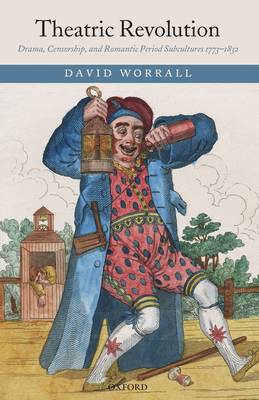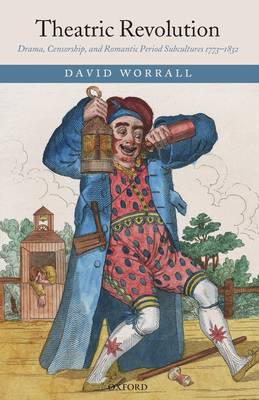
- Afhalen na 1 uur in een winkel met voorraad
- Gratis thuislevering in België vanaf € 30
- Ruim aanbod met 7 miljoen producten
- Afhalen na 1 uur in een winkel met voorraad
- Gratis thuislevering in België vanaf € 30
- Ruim aanbod met 7 miljoen producten
Zoeken
Theatric Revolution
Drama, Censorship, and Romantic Period Subcultures 1773-1832
David Worrall
Paperback | Engels
€ 136,95
+ 273 punten
Uitvoering
Omschrijving
The theatre and drama of the late Georgian period have been the focus of a number of recent studies, but such work has tended to ignore its social and political contexts. Theatric Revolution redresses the balance by considering the role of stage censorship during the Romantic period, an era otherwise associated with the freedom of expression. Looking beyond the Royal theatres at Covent Garden and Drury Lane which have dominated most recent accounts of the period, this book examines the day-to-day workings of the Lord Chamberlain's Examiner of Plays and shows that radicalized groups of individuals continuously sought ways to evade the suppression of both playhouses and dramatic texts. Incorporating a wealth of new research, David Worrall reveals the centrality of theatre within busy networks of print culture, politics of all casts, elite and popular cultures, and metropolitan and provincial audiences. Ranging from the drawing room of Queen Caroline's private theatrical to the song-and-supper dens of Soho and radical free and easies, Theatric Revolution deals with the complex vitality of Romantic theatrical culture, and its intense politicization at all levels. This fascinating new study will be of great value to cultural historians, as well as to literary and theatre scholars.
Specificaties
Betrokkenen
- Auteur(s):
- Uitgeverij:
Inhoud
- Aantal bladzijden:
- 416
- Taal:
- Engels
Eigenschappen
- Productcode (EAN):
- 9780199239139
- Verschijningsdatum:
- 15/11/2008
- Uitvoering:
- Paperback
- Formaat:
- Trade paperback (VS)
- Afmetingen:
- 155 mm x 231 mm
- Gewicht:
- 408 g

Alleen bij Standaard Boekhandel
+ 273 punten op je klantenkaart van Standaard Boekhandel
Beoordelingen
We publiceren alleen reviews die voldoen aan de voorwaarden voor reviews. Bekijk onze voorwaarden voor reviews.











